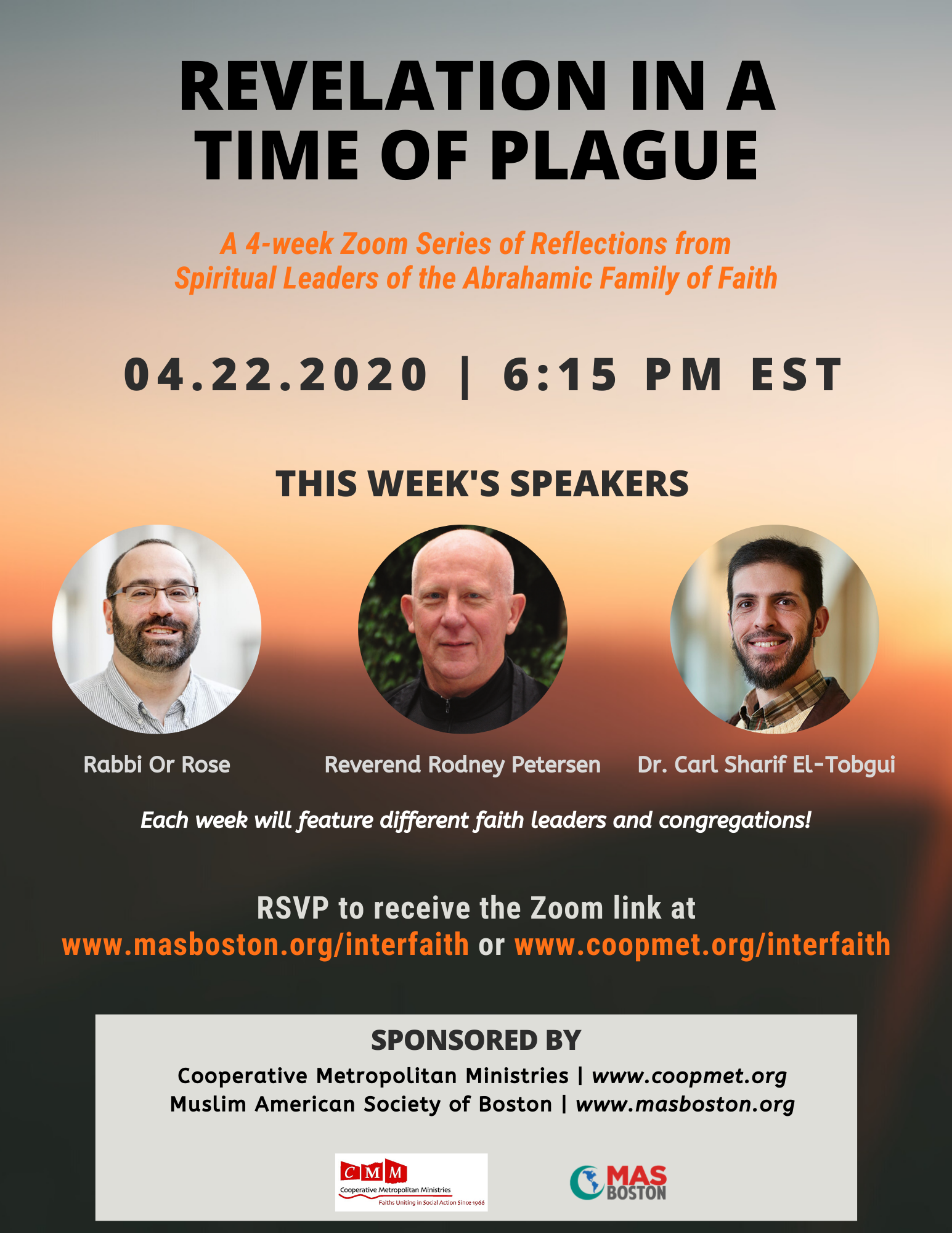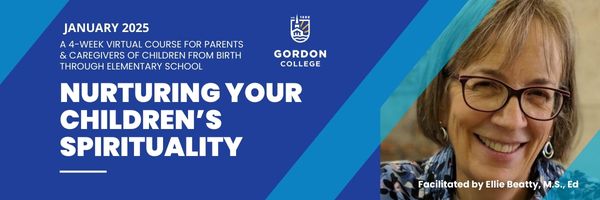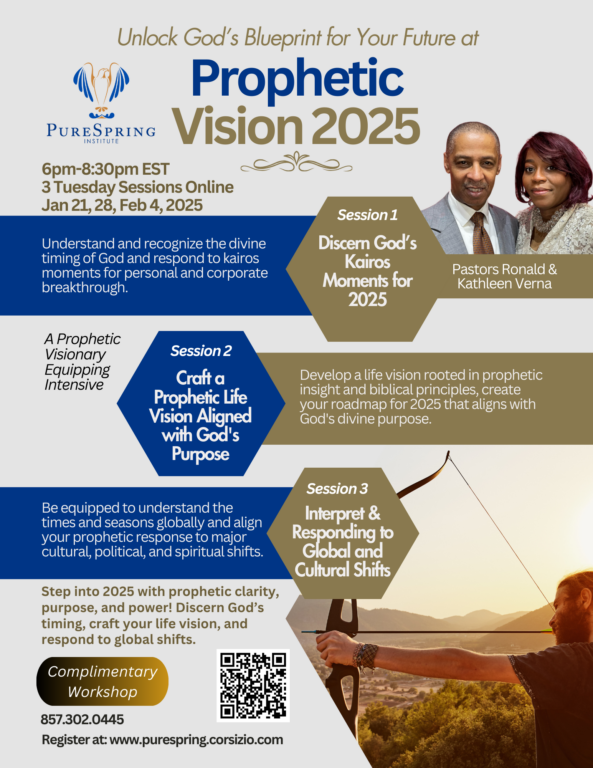Nurturing Relational Connections Across Boston's Christian Community

- This event has passed.
Revelation in a Time of Plague
April 22, 2020 from 6:15 pm - 7:15 pm
|Recurring Event (See all)
An event every week that begins at 6:15 pm on Wednesday, repeating until May 7, 2020

A 4-Week Zoom Series of Reflections from Spiritual Leaders of the Abrahamic Family of Faith
4 Wednesdays, April 22 – May 6, 2020
Hosted by MAS Boston and CMM
Starting this Wednesday, April 22, 6:15-7:15pm EST
To register and receive the Zoom link, please click the link here
This week’s speakers:
- Rabbi Or Rose is the founding Director of the Betty Ann Greenbaum Miller Center for Interreligious Learning & Leadership of Hebrew College. Before assuming this position in 2016, he worked in various administrative and teaching capacities at Hebrew College for over a decade, including serving as a founding faculty member and Associate Dean of the Rabbinical School. Rabbi Rose was also one of the creators of CIRCLE, The Center for Interreligious & Community Leadership Education, cosponsored by Hebrew College and Andover Newton Theological School (2007 – 2017). In addition to his work at Hebrew College, Rabbi Rose has taught for the Bronfman Youth Fellowships, The Wexner Graduate Fellowship, Me’ah, and in a variety of other academic, religious, and civic contexts throughout North America and in Israel. He is the co-editor of Speaking Torah: Spiritual Teachings from Around the Maggid’s Table (Jewish Lights), and the award-winning anthology, My Neighbor’s Faith: Stories of Interreligious Encounter, Growth, and Transformation (Orbis). His most recent publication is the anthology, Words To Live By: Sacred Sources for Interreligious Engagement (Orbis 2018). In 2009 – 2010, he was selected as a member of the Shalom Hartman Institute’s inaugural North American Scholar’s Circle. In 2014, Northeastern University honored him for his interreligious educational efforts.
- Rodney L. Petersen, PhD is executive director of The Lord’s Day Alliance of the U.S. (LDAUSA) and Cooperative Metropolitan Ministries (CMM), greater Boston area’s oldest interfaith social justice network. He is formerly executive director of the Boston Theological Institute, taught in the member schools and overseas, and was co-founder of the Religion and Conflict Transformation program. He serves on the boards of several nonprofit organizations. Petersen is author or co-editor of numerous publications, including, Forgiveness and Reconciliation: Religion, Public Policy and Conflict Transformation (Templeton Foundation Press, 2001); Overcoming Violence (BTI, 2010); Formation for Life: Peacemaking and Twenty – First Century Discipleship (Wipf and Stock, 2013); general editor of George H. Williams, History of Religion at Harvard, 3 volumes (Vandenhoeck & Ruprecht, 2014); and Religion and Public Policy: Human Rights, Conflict, and Ethics (Cambridge University Press, 2015).
- Carl Sharif El-Tobgui, PhD is Associate Professor of Arabic & Islamic Studies and Director of the Arabic Language Program in the Near Eastern and Judaic Studies department at Brandeis University. Professor El-Tobgui’s scholarly expertise lies in the field of Islamic thought, with a special concentration on theology, law, and jurisprudence. He has recently published his first book, Ibn Taymiyya on Reason and Revelation, which examines a 10-volume treatise on the relationship between reason and scripture. In addition to his expertise in Islamic thought, Professor El-Tobgui has a deep love of language in general and of Classical Arabic in particular and has enjoyed for many years exploring the intricacies of Arabic grammar, as well as classical literature and poetry with his students.
This 4-week program that brings together congregations from the three Abrahamic traditions (Muslim, Christian and Jewish) and other interested persons. 12 faith community leaders (a representative three at each of 4 gatherings), will each offer advice to the community regarding some of the questions below (and others as they see fit), and then to open it for the congregants to reflect, ask questions, etc. The questions might be the following:
- What is the role of God in this pandemic?
- What is the role of spirituality and religion?
- What is the role of people of faith?
- How can we connect more with our spiritual being and God so that we can help the world overcome this crisis?
- What do we tell our children when they ask why is God doing this?
- And many others
This program starts on Wednesday, April 22, and ends on Wednesday, May 13, running for an hour each consecutive Wednesday from 5:30-6:30 in the evenings (Except for April 22, we will start at 6:15).
This period of time is sacred to each of these three traditions and symbolic of fresh transcendent revelation. For Muslims it falls during the sacred month of Ramadan, April 23 – May 23, and calls to mind the year 610 A.D. when it is believed that the angel Gabriel appeared to Prophet Muhammad and revealed to him the Quran, the Islamic holy book. For Christians this period begins after Easter (W: April 12; E: April 19) and ends with Pentecost (W: May 31; E: June 7), 50 days after Easter Sunday which commemorates the descent of the Holy Spirit upon the Apostles and disciples of Jesus while they were in Jerusalem to celebrate the Jewish Feast of Weeks. Shavuot (Feast of Weeks) commemorates the revelation of the Torah to Moses and the Jewish people on Mount Sinai, May 28-30.
This program represents a chance for faith leaders to provide more guidance to our congregations regarding the role of spirituality and faith in these trying times, and to leverage this as an opportunity to anchor the faithful to God, in order to come closer to Him, to pray more, and to find answers to big questions that are often posed during a crisis. If faith leaders unite on this purpose we might collectively find an ecumenical and interfaith role in the whole of our societies toward a closer relationship with God or the mystically transcendent, which would benefit everyone.
For more information, please contact Hossam Al-Jabri of MAS Boston (Hossam.aljabri@gmail.com) or Rodney Petersen of CMM (617-331-1747; rlp@coopmet.org)


Leave a Reply